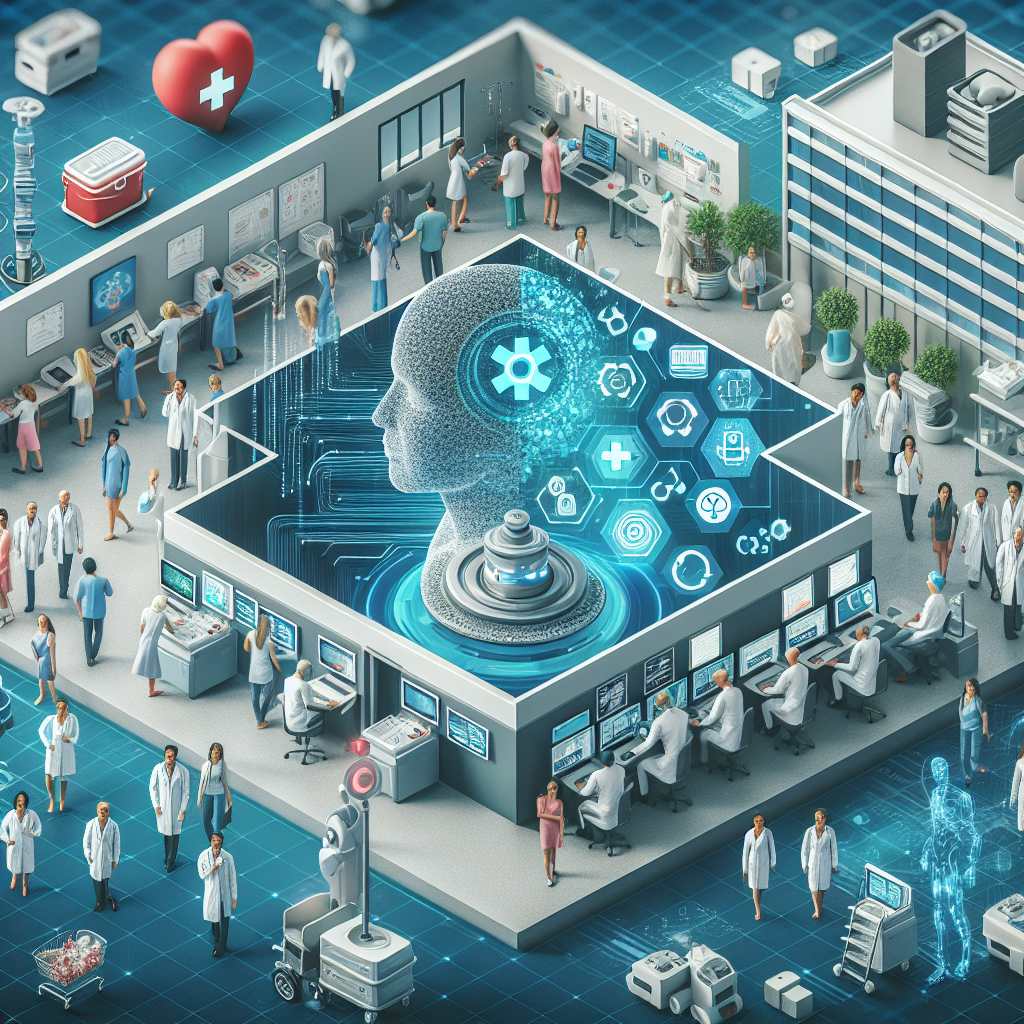Artificial Intelligence (AI) has revolutionized many industries, including healthcare. One area where AI has had a significant impact is in improving healthcare workflow efficiency. By automating repetitive tasks, analyzing large amounts of data, and providing decision support to healthcare professionals, AI has the potential to streamline processes, improve patient outcomes, and reduce costs.
AI algorithms can help healthcare organizations optimize their workflow in a number of ways. For example, AI can be used to automate administrative tasks such as scheduling appointments, processing insurance claims, and managing electronic health records. By freeing up healthcare professionals from these time-consuming tasks, AI allows them to focus on providing high-quality care to patients.
AI can also be used to analyze large amounts of healthcare data, such as medical images, lab results, and patient records. By using machine learning algorithms to identify patterns and trends in this data, healthcare organizations can better understand patient populations, predict disease outbreaks, and personalize treatment plans.
In addition, AI can provide decision support to healthcare professionals by recommending treatment options, alerting them to potential drug interactions, and flagging potential errors in diagnoses. By leveraging AI-powered tools, healthcare providers can make faster, more accurate decisions that lead to better patient outcomes.
One example of how AI is improving healthcare workflow efficiency is in the field of radiology. Radiologists are faced with interpreting large volumes of medical images on a daily basis, which can be time-consuming and error-prone. AI-powered image analysis tools can help radiologists by automatically detecting abnormalities in medical images, prioritizing cases for review, and providing quantitative measurements of disease progression.
By integrating AI into their workflow, radiologists can work more efficiently and effectively, leading to faster diagnoses, reduced errors, and improved patient outcomes. In a study published in the journal Radiology, researchers found that AI algorithms were able to accurately detect breast cancer in mammograms with a sensitivity of 90.2% and a specificity of 90.8%, outperforming human radiologists.
Another example of how AI is transforming healthcare workflow efficiency is in the area of predictive analytics. By analyzing historical data on patient outcomes, healthcare organizations can use AI algorithms to predict which patients are at risk of developing certain conditions, such as heart disease or diabetes. By identifying at-risk patients early on, healthcare providers can intervene with preventive measures, such as lifestyle changes or medication, to improve outcomes and reduce costs.
In a study published in the journal Health Affairs, researchers found that using predictive analytics to identify high-risk patients and provide targeted interventions led to a 29% reduction in hospital admissions and a 33% reduction in emergency department visits. By leveraging AI-powered predictive analytics tools, healthcare organizations can proactively manage patient populations and allocate resources more efficiently.
Despite the many benefits of AI in improving healthcare workflow efficiency, there are also challenges and concerns that need to be addressed. One concern is the potential for bias in AI algorithms, which can lead to disparities in healthcare outcomes for certain patient populations. For example, if an AI algorithm is trained on data that is not representative of the entire population, it may not perform as well for minority groups or underserved communities.
To address this issue, healthcare organizations need to ensure that their AI algorithms are trained on diverse and representative datasets, and that they are regularly monitored and updated to mitigate bias. By incorporating principles of fairness and transparency into their AI systems, healthcare organizations can ensure that they are providing equitable care to all patients.
Another challenge is the need for healthcare professionals to be trained in using AI tools effectively. While AI has the potential to improve healthcare workflow efficiency, it can also be overwhelming for healthcare providers who are not familiar with the technology. Healthcare organizations need to invest in training programs and support systems to help their staff understand how to use AI tools and incorporate them into their daily workflow.
In addition, there are concerns about the privacy and security of patient data when using AI in healthcare. As AI algorithms analyze large amounts of sensitive patient information, there is a risk that this data could be exposed or misused. Healthcare organizations need to implement robust data protection measures, such as encryption, access controls, and audit trails, to safeguard patient privacy and comply with regulations such as the Health Insurance Portability and Accountability Act (HIPAA).
Despite these challenges, the potential benefits of AI in improving healthcare workflow efficiency are vast. By automating tasks, analyzing data, and providing decision support, AI has the power to transform the way healthcare is delivered and improve patient outcomes. As healthcare organizations continue to integrate AI into their workflow, they will need to address these challenges and work towards a future where AI-powered healthcare is accessible, equitable, and effective.
FAQs:
1. What are some examples of AI tools that are used in healthcare workflow efficiency?
– Some examples of AI tools used in healthcare workflow efficiency include chatbots for patient communication, predictive analytics for identifying at-risk patients, and image analysis algorithms for interpreting medical images.
2. How can AI improve healthcare workflow efficiency?
– AI can improve healthcare workflow efficiency by automating administrative tasks, analyzing large amounts of data, and providing decision support to healthcare professionals. By streamlining processes and reducing errors, AI can help healthcare organizations deliver better care to patients.
3. What are some challenges of using AI in healthcare?
– Some challenges of using AI in healthcare include bias in algorithms, training healthcare professionals in AI tools, and protecting patient data privacy. Healthcare organizations need to address these challenges to ensure that AI is used effectively and ethically in the healthcare setting.

